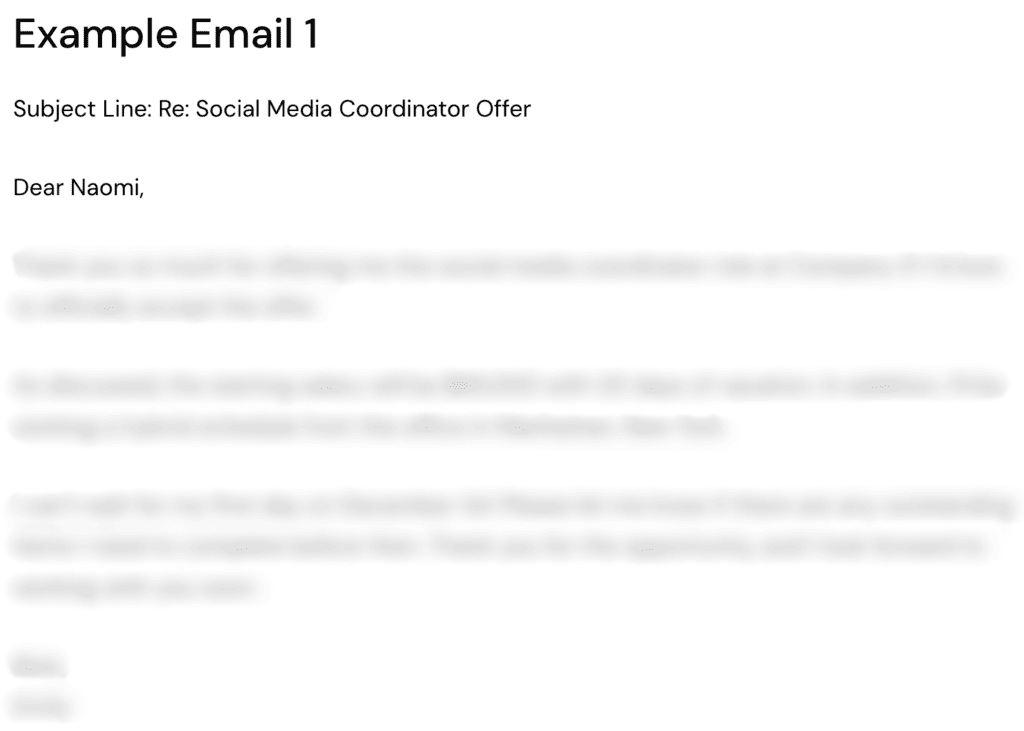You got the job! Before you start celebrating, you’ll need to formally accept your offer. This may involve negotiating the terms of the offer, signing an official offer, and sending a formal acceptance letter via email. In this guide, we’ll walk you through how to accept a job offer.
How to Accept a Job Offer: Process
The process of how to accept a job offer might be confusing if you’ve never gotten an official job offer. While every company is different, here’s what you can generally expect.
1. Receive a Verbal Offer
When you land a job, you usually get two offers: first, the verbal offer and then, the written or formal offer.
A verbal offer is exactly what it sounds like — it’s an offer the hiring manager or recruiter tells you verbally, usually over the phone.
This offer will generally come before a written offer. You’ll likely hear details about the compensation and starting date, but not much more.

Career Readiness
Analyze company sales data for a hypothetical customer and learn how to present your findings to the client.
Avg. Time: 2-3 hours
Skills you’ll build: Communication, project management, project planning
2. Respond to the Verbal Offer
Congratulations! You’ve essentially gotten the job. There are a few ways you can respond to a verbal offer depending on what you’d like to do next.
- If you’re interested but want to negotiate: “Thank you so much for the offer. I’d love to discuss some details with you regarding compensation. Is now a good time for that?”
- If you’re interested but need some more time to consider: “I really appreciate this offer and would love a few days to think it over. Is it possible to read the written offer and respond by Monday?”
- If you’re ready to accept: “Thank you so much! I really appreciate this offer. I accept, on the condition that the written offer matches what we’ve discussed during the hiring process. When can I expect to receive the written offer?”
Even if you’re all ready to accept the offer, you should always ask about when to expect your written offer — also known as the “formal offer.”
3. Receive the Formal Offer
Once you’ve gotten a verbal offer, the hiring manager or recruiter should send over the formal offer. A formal offer is a written offer that should include all of the important details about the role, including your compensation, start date, benefits, expectations of the role, working hours, and location. A formal offer email may look like this:
4. Accept (or Decline!) the Formal Offer
Accepting a job offer email shouldn’t be too complicated, but you’ll need to do a little more than just say yes. You can sign the offer and respond to whoever sent it to you (more details on what to say in that email below). To sign the offer document, you may use secure e-signature software from the company, or you might be required to edit an offer document and add your signature.
If you don’t want to accept the offer, you can respectfully decline the job offer.
When Should I Accept a Job Offer?
Deciding whether or not to accept a job offer is about much more than a single factor, like compensation or work schedule. Instead, consider the whole package of the job and how it’ll affect your life and career, from your work-life balance to promotion opportunities within the company.
>>MORE: How to Find a Job You Love: 3 Things to Do (and 4 to Avoid)
Nema Smith, recruitment specialist, recommends asking yourself multiple questions before accepting a job offer via email:
- Company culture: Could you fit in seamlessly at the company, or would it be a culture shock?
- Values: Would you be proud to say that you work there?
- Salary: Is the compensation in line with standard market rates? Is it in line with how much your skills and experience are really worth?
- Promotion opportunities: Is the incentive plan based on personal achievements or the company’s performance?
- Annual leave: What’s the vacation and sickness allowance?
- Health insurance: What insurance plans does the company offer? What are the premiums? Is dental and vision coverage included? When will you be eligible?
- Equity: What stock options are available? Are stock units given as part of a bonus or do you have to be working at the organization for a certain length of time before you are eligible?
- Education: Will the employer cover your tuition fees if you enroll in relevant paid educational courses?
- Retirement: What contributions will the company make toward your pension?
- Other expenses: Is the use of a company car, cellphone, or computer provided? If so, will these expenses be tax refundable?
- Further benefits: Are any additional benefits offered for gym memberships, daycare, travel costs, sabbaticals, etc.?
Of course, not every person will value the answer to each question as much as the next. For example, if you’re thinking of pursuing higher education while working, tuition reimbursement might be non-negotiable for you. On the other hand, you may want to work for a company that values diversity, equity, and inclusion. If that’s the case, you might not accept a job at a company that doesn’t embody that in its mission.
Whether you accept a job offer or not is entirely personal — which is why it’s crucial to make sure you’re making the right decision for you.

Professional Skills
Self-reflect on your strengths, skills, and preferences, and learn what types of work environments and relationships you work best with.
Avg. Time: 2-3 hours
Skills you’ll build: Self-reflection, discovery, organization, planning
How to Accept a Job Offer Email
Congratulations! You’ve decided this opportunity is right and you’d like to accept the job offer. Here’s how to accept a job offer email.
Review the Offer (Yes, Again!)
While it’s essential to review the offer before you make a decision, review it again before you officially say yes to ensure that you’re OK with everything within the offer. If there’s something you’re unsure about or want to negotiate, ask the hiring manager or recruiter to clarify or set up a meeting with them to discuss.
Negotiate
“I recommend negotiating over the phone if you’re able,” Michelle Doan, ICF career coach and founder of Rising Tide Coaching and Consulting, says. “It can feel scary to do so, but you’ll get more immediate cues from the recruiter on the possibility of getting what you’re asking for. Prior to the phone call, you can send an email stating that you’re excited about the offer, and want to see if there’s a possibility of adjusting X element. That way, the recruiter is prepared for the call and isn’t caught off guard.”
Forage Find
Beware of over-negotiating. If you’ve discussed compensation with the recruiter throughout the process and they’ve been clear about their budget, continuing to negotiate for far more money than what you’ve discussed may cause them to rescind the offer.
If you’d like to negotiate your offer, send an email asking to speak over the phone. Make sure to share your gratitude for the offer and be clear about why you’d like to get on the phone.
Before your phone call, prepare what you’ll say to the hiring manager or recruiter, including any market rate salary or benefits data. This will help ground your arguments in facts vs. feelings and keep you from stumbling when you’re nervous.
>>MORE: How to Negotiate Salary for Beginners (With Examples)
Say Thank You
Start off your job offer acceptance email by showing your gratitude for the offer. Thank whoever you’re writing the email to for the offer, and share that you appreciate them sending the written offer over.
Officially Say “Yes”
If you’ve negotiated and gotten the offer you’re expecting, it’s time to officially say yes to the offer. Be sure to express enthusiasm! It’s better to be straightforward here — getting right to the point will make sure no one’s confused about whether you’re joining the team. You want your excitement to shine through.
Restate the Terms
When accepting a job offer via email, restate the terms of the offer to ensure everyone has their details straight. For example, you might want to reiterate the starting date, compensation, critical benefits, and other information you want to make sure is correct about the offer.
Ask for Next Steps
Finally, ask the hiring manager and/or recruiter for next steps with the offer. Is there any other paperwork you need to complete or onboarding action items before your first day? Ask about these in your job offer acceptance email now to avoid running into surprises or outstanding items before you officially start.

Resume Masterclass
Learn how to craft a resume that gets you hired, from your professional summary to what skills and experiences to include (even if you don't have professional work experience).
Avg. Time: 5-6 hours
Skills you’ll build: Professional brand, transferable skills, illustrating your impact in teams, showcasing outcomes of your contributions
Job Offer Acceptance Email Examples
Accepting a job offer email can feel exciting, but also nerve-wracking. You’ll need to say yes to the offer, clarify the terms, and prepare for your first day. What does that look like in an email? Log in to see three examples of a job offer acceptance email.

Have you accepted your offer? Congratulations! Prepare for your first job and learn workplace skills like time management, presentation skills, and business communication etiquette with Forage interview and career skill programs.
